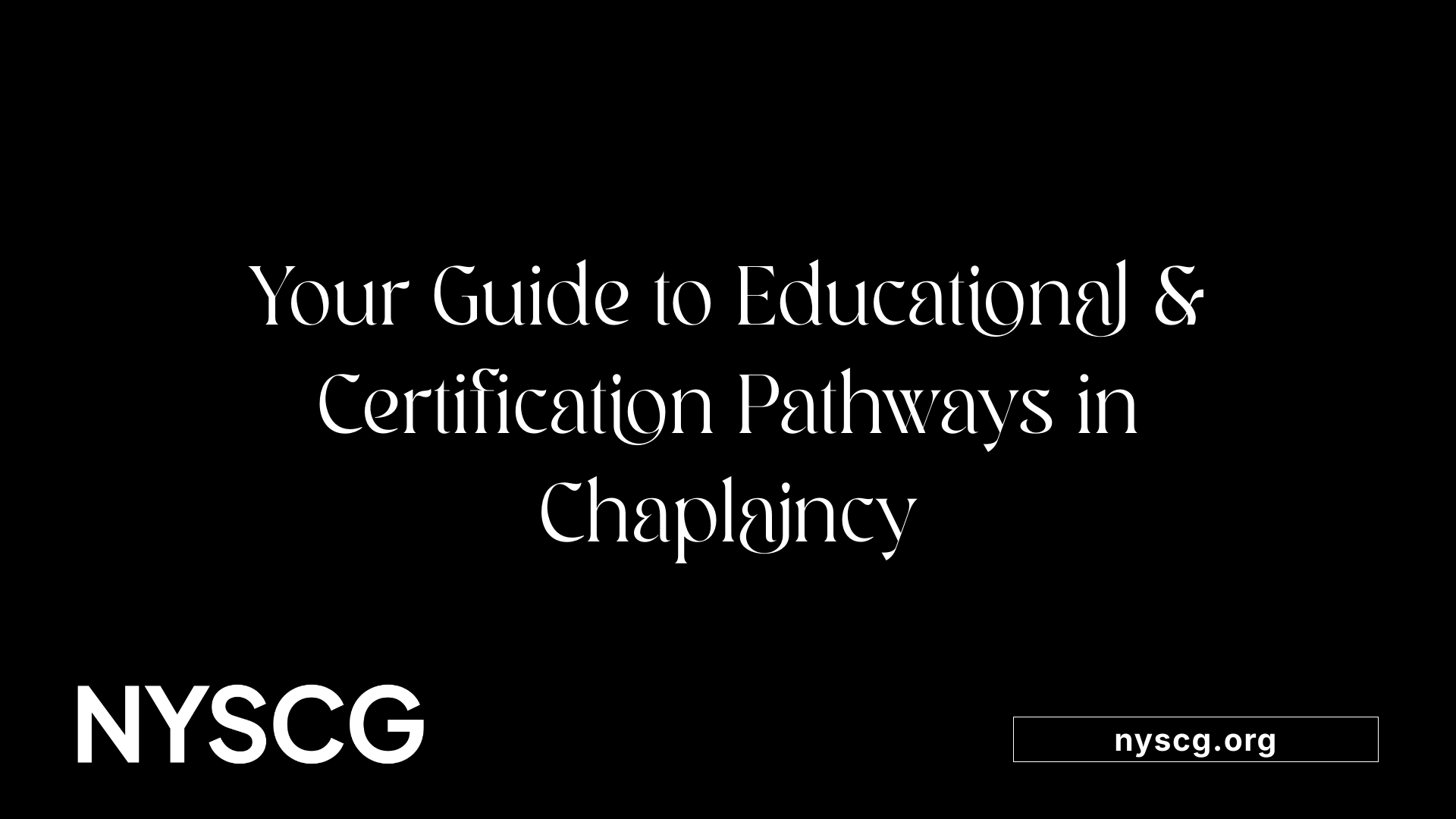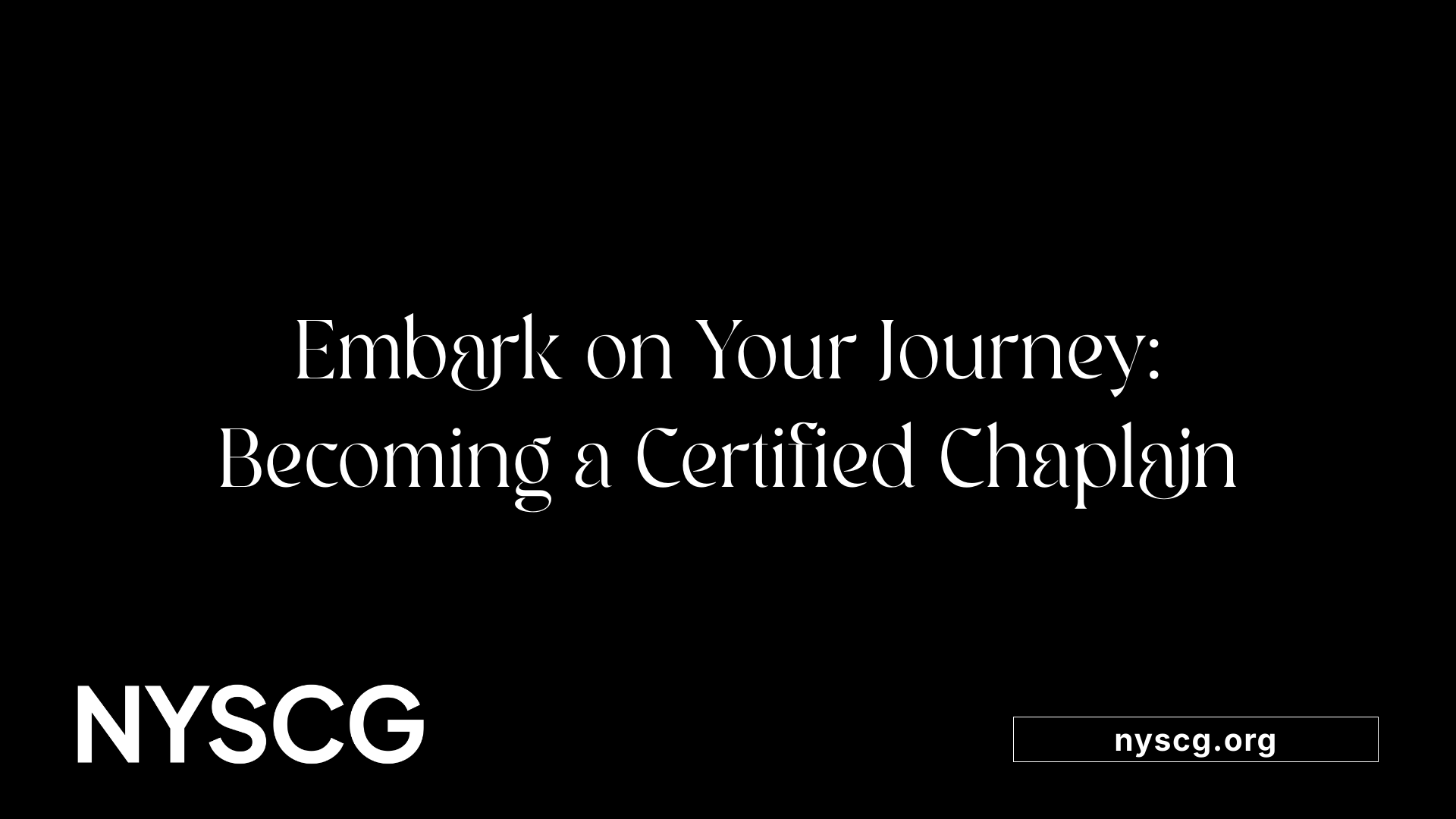What Types of People Make the Best Chaplains?


Chaplains serve as vital pillars of emotional and spiritual support across a wide range of settings including hospitals, military, prisons, and community organizations. But what qualities and backgrounds do the most successful chaplains possess? This article explores the personal attributes, educational pathways, and diverse roles that define the ideal candidates for chaplaincy, offering a comprehensive look at the professional landscape and the qualities that make for outstanding spiritual caregivers.

A successful chaplain is characterized by a blend of compassion, empathy, humility, and integrity. These qualities form the foundation of trust, enabling the chaplain to support individuals effectively across various settings such as hospitals, prisons, or military bases.
Compassion and empathy are vital, allowing chaplains to understand and share in the feelings of those they serve. Active listening skills enable them to attend carefully to others, ask clarifying questions, and foster a nonjudgmental environment. Cultural sensitivity is also crucial, as many chaplains work with diverse populations, requiring respectful engagement regardless of differing beliefs or backgrounds.
Spiritual confidence and humility are equally important, helping chaplains to maintain genuine concern for others while exemplifying integrity. Respecting confidentiality and personal boundaries protects the dignity of those in their care, facilitating trust and openness.
Above all, a caring presence rooted in faith or community values guides their actions. Authentic engagement, driven by a genuine desire to serve, helps chaplains make a meaningful difference in the lives of others during times of pain, setbacks, or celebration.
Effective support as a chaplain depends on key skills such as active listening, effective communication, boundary setting, and cultural competence. These enable the chaplain to build respectful and trusting relationships with individuals from diverse backgrounds.
Personal traits like compassion, humility, integrity, and adaptability are essential for genuine connection and effective ministry. A successful chaplain also exhibits emotional stability, openness, and resilience—important qualities when facing rejection or hostility.
Discretion and high ethical standards ensure confidentiality and respect within sensitive situations. An overarching sense of call or commitment to service energizes their work and sustains them through challenging moments.
Combining these skills and traits creates a compassionate, competent professional capable of making a lasting impact in the life of each person they serve.

To pursue a career as a chaplain, individuals generally need to meet specific educational standards, which vary depending on the setting and organization. Most employers and certifying bodies expect candidates to have post-secondary education, commonly a bachelor’s degree, with many preferring a master's degree such as a Master of Divinity (MDiv), Master of Theological Studies (MTS), or a related field. For example, healthcare chaplains often require advanced theological education to provide effective spiritual support.
In addition to formal degrees, completing Clinical Pastoral Education (CPE) is essential. CPE comprises supervised practice internships that focus on pastoral and emotional care, usually totaling four units. Accreditation for CPE programs by the Association for Clinical Pastoral Education (ACPE) is highly regarded and often a prerequisite for certification.
Beyond degrees and CPE, many chaplains seek additional certifications or endorsements from professional organizations like the NACC (National Association of Catholic Chaplains) or other faith-based certifying bodies. These credentials ensure that the chaplain has met standards for training, experience, and ongoing professional development.
What about flexible learning options?
To accommodate diverse needs, numerous educational institutions offer online, part-time, and hybrid programs. Online courses in theology, pastoral care, and related subjects are widely available through universities like Global University or other theological seminaries, allowing students to study while working or managing personal commitments. Such programs often include real-world CPE placements aligned with the learner’s schedules.
In sum, becoming a qualified chaplain typically involves obtaining at least a bachelor's degree, followed by graduate studies in theology or ministry, completing accredited CPE, and earning certification or endorsement. These educational pathways prepare individuals to serve effectively across various environments and meet the high standards expected in the field.

Becoming a hospital chaplain involves a series of educational and practical steps. Most candidates start by earning a bachelor's degree in fields like religion, theology, or religious studies. This undergraduate education lays the foundation for further training.
Following this, the next step is typically enrolling in a master's program such as a Master of Divinity (MDiv) or a related graduate degree, which focuses on pastoral care, spirituality, and ethical practice. These programs often include coursework that prepares students for the spiritual and emotional needs they'd encounter in healthcare settings.
A crucial component of training is completing at least four units of Clinical Pastoral Education (CPE). These supervised, hands-on courses take place in clinical settings like hospitals and often involve real cases with mentorship from experienced chaplains. CPE provides essential practical experience, honing skills like crisis intervention and compassionate listening.
Once education and CPE are complete, aspiring chaplains seek endorsement from a recognized faith group or professional organization. This endorsement confirms their readiness to serve and aligns them with a faith community.
Certification through organizations like the Association of Professional Chaplains (APC) or the National Association of Catholic Chaplains (NACC) is usually required for working in healthcare environments. Certification involves meeting specific criteria, including education, supervised work hours, and ongoing education.
The entire process—from initial education to certification—generally spans 4 to 6 years. This comprehensive preparation equips individuals to serve effectively, offering spiritual and emotional support to patients, families, and healthcare staff.
To succeed, chaplains need a blend of skills and personal qualities. Active listening skills help in understanding patients' needs and concerns accurately.
Empathy and compassion are vital for building trust and offering genuine support. Effective communication, including the ability to convey comfort and clarity, helps foster rapport with individuals from diverse backgrounds.
Boundary setting ensures confidentiality and respects personal limits, especially important given the sensitive nature of chaplaincy work.
Apart from skills, personal traits such as humility, integrity, cultural sensitivity, and resilience boost effectiveness. A deep sense of calling and commitment to service drive chaplains to serve with authenticity.
Success in this field also depends on emotional stability and openness to different faiths and worldviews. These qualities enable chaplains to navigate complex situations with professionalism and respect, providing meaningful spiritual care.

Embarking on a career as a chaplain involves a combination of education, practical experience, and certification. Most candidates start with obtaining at least a bachelor’s degree, often in theology, divinity, psychology, or related fields. Many pursue graduate degrees like a Master of Divinity or Masters in Religious Studies to deepen their knowledge.
A crucial step is completing Clinical Pastoral Education (CPE), which involves supervised practice in settings such as hospitals, prisons, or military installations. These programs, accredited by organizations like ACPE, provide hands-on experience dealing with diverse needs.
Certification from professional groups like the Board of Certification for Chaplaincy (BCCI) further enhances employability. This process typically requires demonstrating competencies through coursework, practical experience, and passing certification exams.
Throughout their careers, chaplains seek additional specialized training. Courses in disaster response, crisis management, psychological first aid, or law enforcement chaplaincy help them serve in specific contexts. Continuous professional development ensures they stay updated with best practices and expand their scope of service.
Chaplains can attain different endorsement levels based on their experience, education, and ministry involvement. These levels include:
Endorsement LevelRequirementsDescriptionAssociate Chaplain RecognitionLocal church credentials, some experienceSuitable for volunteers or part-time rolesStandard EndorsementFive years of ministry, relevant educationFor experienced chaplains serving in various settingsBasic EndorsementTwo years of experience, necessary educationFor employed chaplains not meeting the criteria for standard endorsementAdvanced EndorsementMaster’s degree, five years care, full-time employmentFor highly qualified, full-time chaplains with specialized credentials
These levels are established by Chaplaincy Ministries to recognize the evolving experience and qualifications of chaplains as they progress.
Joining organizations such as the National Association of Chaplains or others like the International Fellowship of Chaplains (I.F.O.C.) provides vital networking and learning opportunities. These groups offer workshops, certifications, and forums to share best practices.
Networking within these organizations can open doors to new job roles and leadership opportunities. Moreover, they promote ongoing education through courses, webinars, and conferences to keep chaplains abreast of emerging issues in spiritual and emotional care.
Continuous education and training are essential for career advancement. Many organizations also offer specialized certifications, equipping chaplains to work effectively in specific environments like law enforcement, disaster zones, or mental health sectors.
As the profession continues to evolve with societal changes and increasing diversity, chaplains need to adapt. Ongoing education helps deepen their understanding of different faith traditions, cultural sensitivities, and specific crisis scenarios.
It also ensures chaplains are competent in crisis intervention skills, emotional intelligence, and effective communication. Certifications in areas such as trauma support or crisis response can significantly enhance their ability to serve effectively.
By investing in continual learning and professional development, chaplains can grow into leadership roles, specialize in emerging areas, and contribute meaningfully across various sectors.
AspectFocusOpportunitiesEducationDegrees, certificationBachelor's, Master's, specialized trainingExperiencePractical fieldworkCPE programs, volunteer rolesCertificationProfessional recognitionBoard certification, endorsementsSpecializationNiche skillsDisaster response, law enforcement, mental healthProfessional GroupsNetworkingConferences, workshops, forums
Expanding skills and credentials through ongoing learning across these areas allows chaplains to remain effective, compassionate, and adaptable in their diverse roles.
The journey to becoming a successful chaplain involves a combination of personal qualities, rigorous education, practical experience, and ongoing professional development. Individuals drawn to this vocation often possess a compassionate heart, strong listening skills, and a genuine desire to serve and support others during their most vulnerable moments. With diverse pathways available—ranging from online courses to extensive clinical training—aspiring chaplains can tailor their preparation to their unique backgrounds and goals. As demand grows across various sectors, well-qualified chaplains who embody empathy, cultural sensitivity, and faith-based confidence are uniquely positioned to make the most meaningful impact in the lives they serve.
All you need is the will to make the world a better place.
New York State chaplain group inc. is a tax deductible organization with a federal tax Id number 92-383-4921